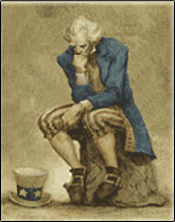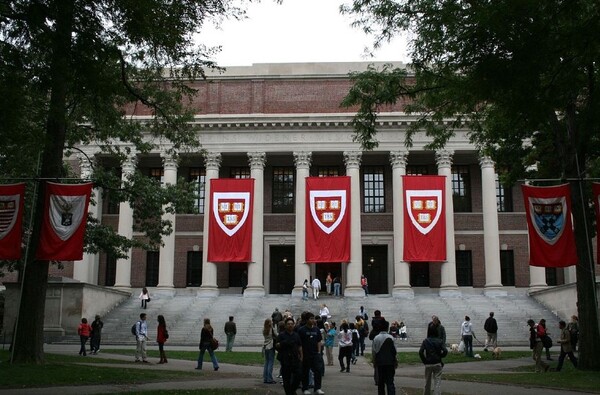
(function(d, s, id) { var js, fjs = d.getElementsByTagName(s)[0]; if (d.getElementById(id)) return; js = d.createElement(s); js.id = id; js.src = “https://connect.facebook.net/en_US/sdk.js#xfbml=1&version=v3.0”; fjs.parentNode.insertBefore(js, fjs); }(document, ‘script’, ‘facebook-jssdk’)); –>
–>
January 28, 2024
Founded by Puritan settlers in the Massachusetts Bay Colony in 1636, Harvard University is the oldest and most prestigious university in the United States and one of the best known in the world. Today, Harvard’s future hangs in the balance. How did Harvard arrive at this junction? Can it be reformed?
‘); googletag.cmd.push(function () { googletag.display(‘div-gpt-ad-1609268089992-0’); }); document.write(”); googletag.cmd.push(function() { googletag.pubads().addEventListener(‘slotRenderEnded’, function(event) { if (event.slot.getSlotElementId() == “div-hre-Americanthinker—New-3028”) { googletag.display(“div-hre-Americanthinker—New-3028”); } }); }); }
Harvard College was founded to educate Puritan clergy in Holy Scripture from the original Hebrew and Greek and in the Latin writings of the Church Fathers, the Scholastic philosophers, and the Reformers. In 1639, Harvard was named after John Harvard, who bequeathed his library of more than 400 books and a large sum of money for the building fund.
Henry Dunster, a young graduate of Cambridge University, became the first president of Harvard in 1640. He instituted a three-year classical academic course for the Bachelor’s degree based on the English university model of Oxford and Cambridge, but consistent with the Puritan philosophy of the first colonists. Fearing that without a religious education their children would become barbarians, the colonists deemed educating clergy most urgent. Although the broad purpose of Harvard was the advancement of knowledge, students were reminded that acquiring knowledge for its own sake without Christ as the foundation was futile.
By the 1690s, Harvard had already drifted leftward with liberal, anti-Calvinist influences infiltrating the governing body. Because Harvard had become so liberal, by 1701, Yale University was founded. In 1707, John Leverett became Harvard’s first liberal layman president, ending the pattern of hiring orthodox Puritan clergy.
‘); googletag.cmd.push(function () { googletag.display(‘div-gpt-ad-1609270365559-0’); }); document.write(”); googletag.cmd.push(function() { googletag.pubads().addEventListener(‘slotRenderEnded’, function(event) { if (event.slot.getSlotElementId() == “div-hre-Americanthinker—New-3035”) { googletag.display(“div-hre-Americanthinker—New-3035”); } }); }); }
During the first 50 years of our nation, there were important intellectual and philosophical changes with far-ranging consequences. By 1800, the liberalism established by Leverett set Harvard on a secular course with Unitarianism, which rejects the Trinity, the divinity of Christ, and the tenets of Calvinism. With the 1805 takeover of Harvard by Unitarians, Harvard became the citadel of religious and moral liberalism and anti-Calvinism, with compulsory morning chapel being jettisoned in the 1880s.
Although Harvard Divinity School claims to be non-sectarian, it is overwhelmingly Unitarian Universalist in orientation and closer to Buddhism, deism, and the New Age movement than to Christianity. The presence of Muslim and humanist chaplains further confirms that Harvard has strayed far from its founding principles.
There was a vast difference between the biblical views of Calvinists and liberals. Calvinists hold a God-centered worldview and believed man to be innately sinful. Unitarians reject this God-centered worldview, believing that evil is caused by ignorance, poverty, social injustice, and other environmental and social factors. They believe that man can be perfected through education, which will eliminate ignorance, which will eliminate poverty, which will eliminate social injustice, which will eliminate crime. It was Unitarians, along with socialists, who were a major force in the public education movement so they could control what children learn. It is Unitarian liberalism, at the core of American political liberalism, that holds that government can solve all of society’s problems.
Because of its liberal philosophy, Harvard has had a longstanding practice of affirmative action. Under the leadership of racist, left-wing ideologue Claudine Gay as professor, dean, and president, a DIE program was developed that has influenced every faucet of university life. Her racist ideology informed her scholarship, administrative policies, and rise in the university. Even after the Supreme Court found Harvard’s racially discriminatory admissions program directed toward whites and Asians unconstitutional, Gay defended the university’s policies.
Gay has drawn the ire of not only the public, but wealthy donors for her failure to stop the rampant antisemitism on campus following the October 7 terrorist attack by Hamas on Israel and for her flagrant plagiarism in her academic work, exposing her as an academic fraud. Billionaire Jewish investor and Harvard alumnus Bill Ackman demanded her termination, claiming that she “has done more damage to the reputation” of the institution than any other individual in its nearly 500-year history” and cost the university more than one billion dollars in donations.
Ultimately resigning, Gay admitted no wrongdoing but blamed “personal attacks and threats fueled by racial animus.”
‘); googletag.cmd.push(function () { googletag.display(‘div-gpt-ad-1609268078422-0’); }); document.write(”); googletag.cmd.push(function() { googletag.pubads().addEventListener(‘slotRenderEnded’, function(event) { if (event.slot.getSlotElementId() == “div-hre-Americanthinker—New-3027”) { googletag.display(“div-hre-Americanthinker—New-3027”); } }); }); } if (publir_show_ads) { document.write(“
Although the right views Gay’s resignation as a victory, the fact is that Harvard is not going to change, nor will its DIE program be abolished. Like most all academia, the university has been captured and hollowed out by leftist ideologues who want to destroy Western civilization and replace it with their own totalitarian utopia.
Instead of firing Gay, the board chose to retain her as a professor, despite her plagiarism, with a salary of approximately $900,000. A letter by nearly 700 faculty members to the board urged not only that Gay not be terminated, but that public opinion be ignored. In his message to the Harvard community, interim president Alan Garber signaled that the spirit of DIE will continue: “Rededicating ourselves to free inquiry and expression, in a climate of inclusion and a spirit of mutual respect, has never mattered more.” A January 18 email to the public from Sherri Charleston, chief diversity and inclusion officer, also signaled that nothing will change: “It is no easy task to write this to you after all that has transpired — across our world, in our nation, and here, within the Harvard community over the past weeks and months — and yet I am writing buttressed by hope. To be clear, hope does not require the absence of grief or despair. Hope, for me, is simply a refusal to concede defeat.”
Harvard University, and others like it, cannot be reformed. They are akin to a house with a rotten foundation. The public must accept that these institutions are our enemies who intend to destroy us and our way of life. They must be abolished and new universities established with the singular purpose of academic learning as were the original universities.
Woke institutions cannot survive if their funding is cut. Already big donors are yanking their money. Increasing the rate at which large university endowments are taxed is another arrow in our quiver. Ohio senator J.D. Vance has proposed a bill to raise the tax rate of endowments over $10 billion from 1.4 percent to 35 percent. With reduced funding, there will be fewer slush funds for woke programs such as DIE.
Woke institutions cannot survive if students find better options elsewhere. Elite schools will lose their veneer of prestige and experience degree deflation as the public rejects these overpriced indoctrination centers that lack academic rigor. Already a counterrevolution is underway.

Image: Widener Library, Harvard University. Credit: Joseph Williams via Wikimedia Commons, CC BY-SA 2.0.
<!–
–>
<!– if(page_width_onload <= 479) { document.write("
“); googletag.cmd.push(function() { googletag.display(‘div-gpt-ad-1345489840937-4’); }); } –> If you experience technical problems, please write to [email protected]
FOLLOW US ON
<!–
–>
<!– _qoptions={ qacct:”p-9bKF-NgTuSFM6″ }; ![]() –> <!—-> <!– var addthis_share = { email_template: “new_template” } –>
–> <!—-> <!– var addthis_share = { email_template: “new_template” } –>




